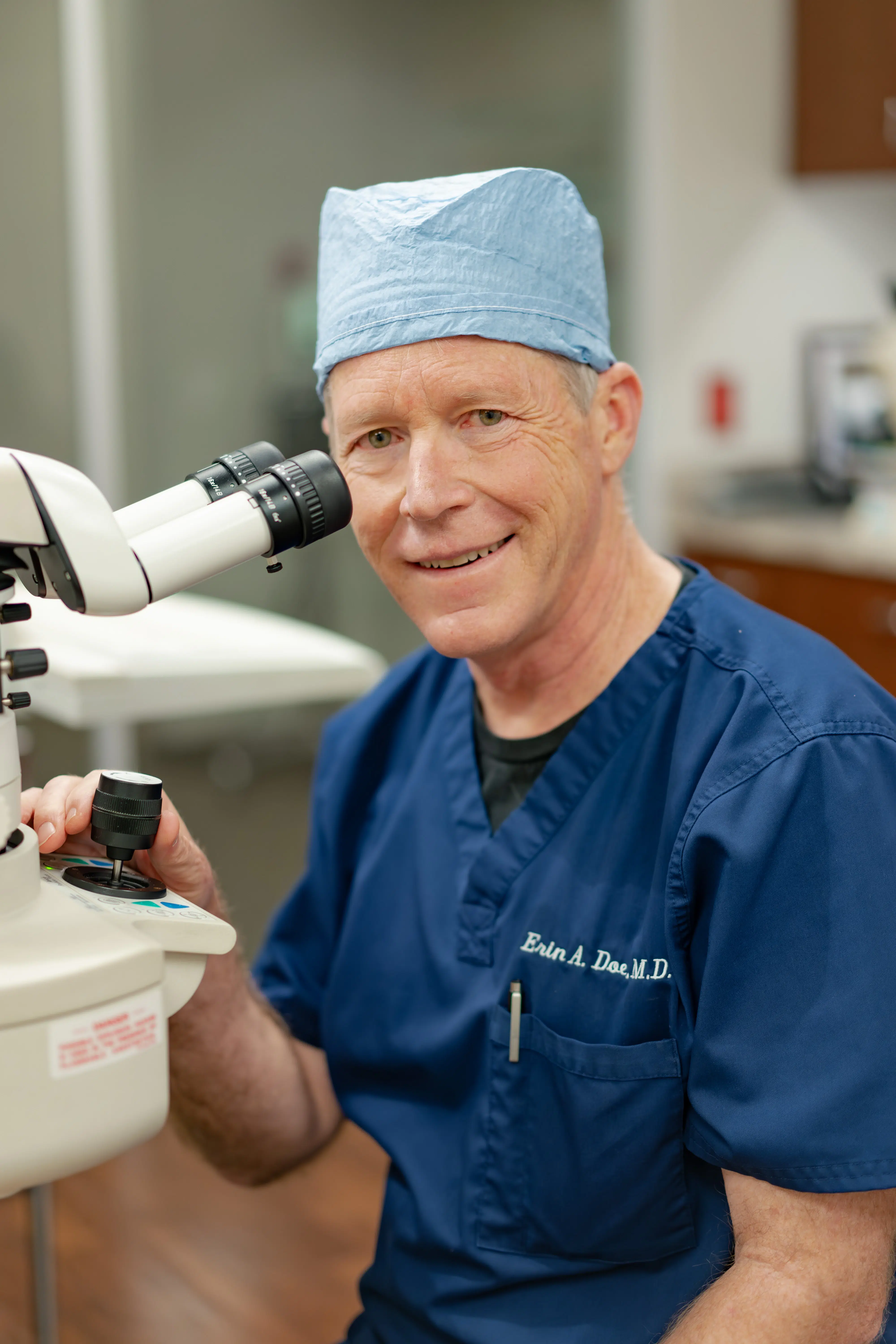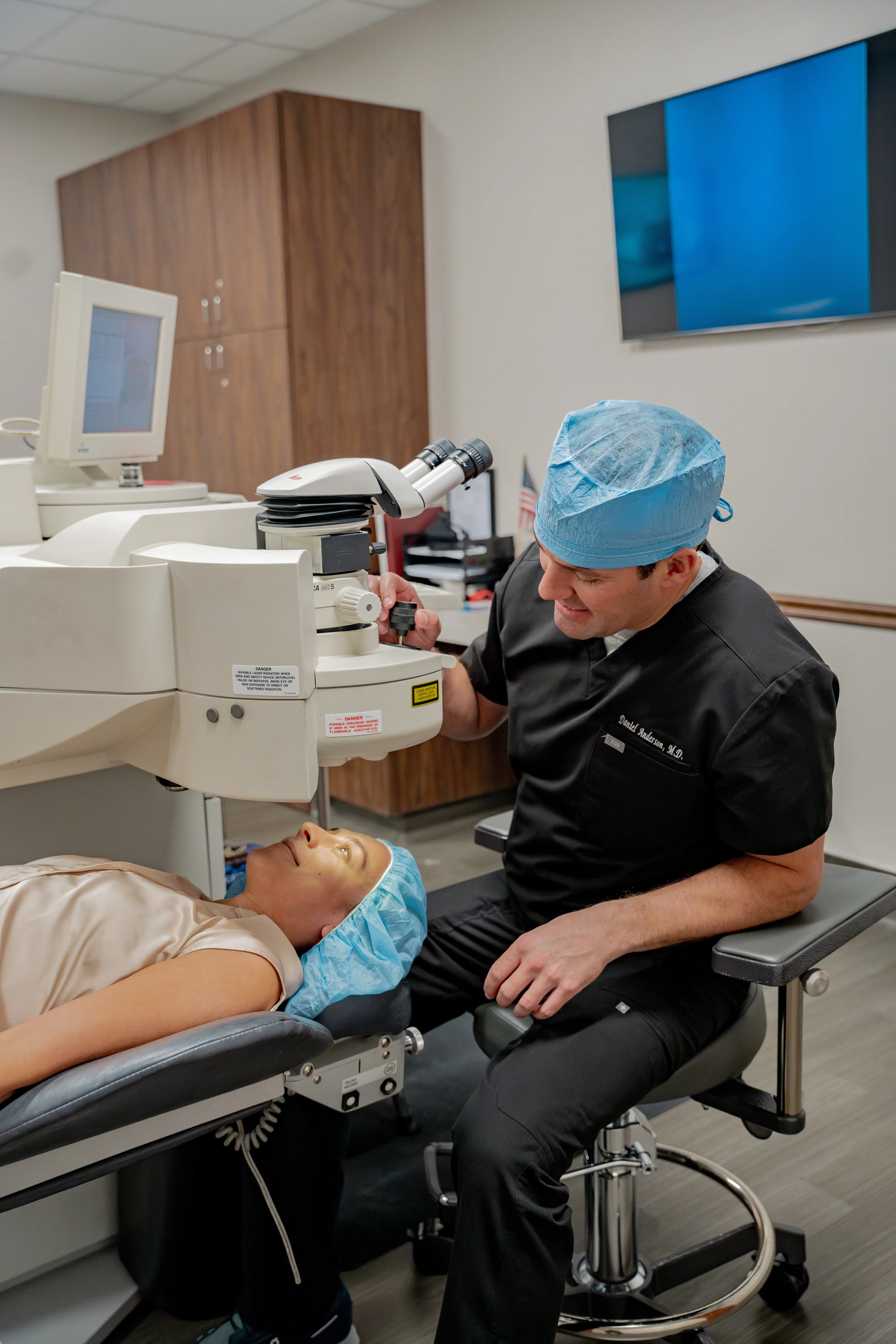Are You a Candidate for LASIK Eye Surgery in Houston?
Considering LASIK eye surgery to reduce your dependence on glasses or contact lenses? You’re in good company! Millions have successfully undergone this life-changing procedure. However, while LASIK is incredibly common and boasts a high safety profile, it isn’t the perfect vision correction solution for every individual. So, how do you know if you qualify?
Determining LASIK candidacy requires a thorough assessment of your unique eyes and overall health by experienced professionals. At Berkeley Eye Center, our commitment to patient safety and achieving optimal outcomes means we conduct meticulous screenings for every potential candidate using advanced diagnostic technology.
On This Page
Understanding LASIK: How Does It Correct Vision?
LASIK, short for Laser-Assisted In Situ Keratomileusis, is a highly precise surgical procedure designed to correct common vision problems. Using an advanced laser, LASIK gently reshapes your cornea – the clear front surface of your eye. This reshaping allows light entering the eye to focus correctly on the retina at the back of the eye, resulting in clearer vision and potentially reducing or eliminating your need for corrective eyewear like glasses or contact lenses. LASIK can effectively treat:
Why Is a Detailed Candidacy Screening Your First Step?
At Berkeley Eye Center, your safety and vision results are our top priorities. A thorough candidacy evaluation isn’t just a formality; it’s a critical step to ensure:
Our Houston clinics utilize advanced diagnostic technology, including detailed corneal topography (mapping), during your complimentary consultation. This gives us a precise picture of your corneal shape, thickness, and overall eye health. The final determination of your candidacy is always made individually by one of our experienced Houston LASIK surgeons after carefully reviewing your examination findings, test results, and health history.
Key Factors We Evaluate for LASIK Candidacy in Houston
During your comprehensive LASIK consultation, our team carefully assesses several critical factors:
Age & Vision Stability
- Minimum Age: You must generally be at least 18 years old. Some surgeons prefer patients to be in their early 20s. This ensures your eyes have fully matured and your vision is more likely stable.
- Stable Vision: Your glasses or contact lens prescription should have remained stable for at least one year prior to surgery. Correcting unstable vision can lead to less predictable or temporary results. Frequent changes in your prescription may indicate LASIK isn’t the right choice at this time.
- Upper Age: While there’s no strict upper age limit, individuals over 40 will be evaluated for age-related conditions like presbyopia (the need for reading glasses) and early cataracts. Depending on your goals, LASIK (potentially with monovision) or alternatives like Refractive Lens Exchange (RLE) might be discussed.
Prescription Strength (Including Astigmatism)
- Refractive Error Range: LASIK is FDA-approved to correct specific ranges of nearsightedness, farsightedness, and astigmatism. While these provide guidelines, your individual eye structure is also critical.
- LASIK for Astigmatism: Yes! A common question is whether LASIK can fix astigmatism. For the vast majority of patients, LASIK is a highly effective procedure for correcting astigmatism by reshaping the irregular corneal curvature that causes it.
- High Prescriptions: If you have a very high level of nearsightedness or other refractive errors outside the typical LASIK treatment range, our surgeons may recommend an alternative procedure like EVO ICL, which can often correct higher degrees of refractive error.
Corneal Health, Shape & Thickness
- Importance: The LASIK procedure involves creating a corneal flap and reshaping the underlying tissue. Therefore, the health and structure of your cornea are paramount.
- Thickness: Your cornea must be sufficiently thick to allow for safe flap creation and tissue reshaping without compromising its structural integrity.
- Shape & Health: Certain corneal conditions disqualify individuals from LASIK. Keratoconus, a progressive disease causing corneal thinning and bulging into a cone shape, is a primary example.
- Screening: At Berkeley Eye Center, we perform detailed corneal topography (mapping) on ALL potential LASIK candidates to meticulously screen for Keratoconus and other subtle irregularities that could impact safety or outcomes.
- Other Factors: Significant corneal scarring from past injuries or infections may also affect candidacy and requires careful evaluation.
Overall Eye Health
- Beyond the cornea, your eyes must be generally healthy. Conditions that may need to be addressed or could disqualify you include:
- Severe Dry Eye Syndrome: While common, severe or unmanaged dry eye can affect healing and comfort after LASIK. Often, dry eye needs treatment before LASIK can be considered. Many patients with mild-to-moderate dry eye can successfully have LASIK after appropriate evaluation and management.
- Glaucoma: Uncontrolled glaucoma typically prevents LASIK candidacy. We measure eye pressure during your evaluation.
- Cataracts: If cataracts are present and affecting vision, cataract surgery is the appropriate treatment, not LASIK.
- Other Issues: Active eye infections, inflammation, or conditions like Pterygium require resolution or evaluation before considering LASIK.
General Health & Lifestyle
- Your overall health plays a role in healing. Conditions that require careful consideration include:
- Uncontrolled Diabetes: Can impair healing and increase infection risk. Diabetic eye disease must also be ruled out.
- Certain Autoimmune Diseases: Conditions like Lupus, Rheumatoid Arthritis, Multiple Sclerosis, or Sjogren’s Syndrome may affect healing and require careful evaluation by our surgeons.
- Medications: Use of certain medications (like immunosuppressants) needs to be discussed.
- Full Disclosure is Essential: For your safety, it’s critically important to provide a complete medical history, including all conditions and medications, during your consultation.
- Lifestyle Factors: While less common as disqualifiers, factors like working in extremely dusty environments or participating in high-impact contact sports may be discussed regarding potential risks.
Pregnancy & Nursing
- LASIK is not recommended during pregnancy or while nursing. Hormonal fluctuations during these times can cause temporary changes in your vision prescription, making accurate treatment planning difficult. It’s best to wait several months after childbirth or cessation of nursing for your vision to stabilize.
Realistic Expectations
- A good candidate understands what LASIK can and cannot achieve. While the goal is significant reduction or elimination of dependence on glasses/contacts, outcomes vary. It’s important to discuss:
- Potential for needing glasses for some activities (e.g., reading vision due to presbyopia typically starting after age 40, even after LASIK).
- Understanding potential (usually temporary) side effects like dry eye or night glare (covered in detail on our LASIK FAQ page).
- The small possibility of needing an enhancement procedure later.
- Feeling personally comfortable with the decision to have surgery.

What If I’m Not an Ideal Candidate for LASIK?
At Berkeley Eye Center, our primary goal is to recommend the safest and most effective vision correction solution for your specific eyes. We prioritize patient safety and will only recommend LASIK if it’s truly the right choice. A portion of candidates we evaluate are better suited for other advanced procedures.
However, not being a candidate for LASIK does not mean you can’t achieve clearer vision! Our highly skilled surgeons are experienced in a range of state-of-the-art vision correction alternatives, including:
If LASIK isn’t the right fit, your comprehensive consultation will help determine the best treatment alternative for your vision needs, if applicable. You can also Compare Vision Correction Procedures here.
Determine Your Candidacy: Your Free Houston LASIK Consultation
The only definitive way to know if you qualify for LASIK is through a comprehensive, in-person evaluation. Berkeley Eye Center offers a complimentary (FREE) LASIK consultation for this purpose. During your visit, you can expect:
This no-obligation evaluation by our dedicated Houston LASIK specialists provides the information you need to make an informed decision about your vision correction journey.

Frequently Asked Questions About LASIK Candidacy
What is the typical age range for LASIK?
Candidates must be at least 18 years old, but many surgeons prefer patients to be in their early 20s to ensure vision stability. There’s no strict upper age limit, but other factors like presbyopia or cataracts are considered in older patients.
Does LASIK work for astigmatism?
Yes! LASIK is very effective at correcting most levels of astigmatism by precisely reshaping the irregular cornea. Your specific level of astigmatism will be evaluated during your consultation.
Can I get LASIK if I have dry eyes?
It depends on the severity. Many patients with mild-to-moderate dry eye can have LASIK successfully, often after treatment to optimize the ocular surface before surgery. Severe, untreated dry eye may be a contraindication. A thorough evaluation is necessary.
What if my prescription isn’t stable?
If your glasses or contact lens prescription has changed significantly within the last year, LASIK is generally not recommended until it stabilizes. Performing LASIK on unstable vision can lead to less predictable and less permanent results.
What happens if I’m told I’m not a good candidate for LASIK?
Take the First Step Towards Clearer Vision
Ready to explore how advanced vision correction surgery can change your life? Learn more about your options and find out which procedure might be right for you.
